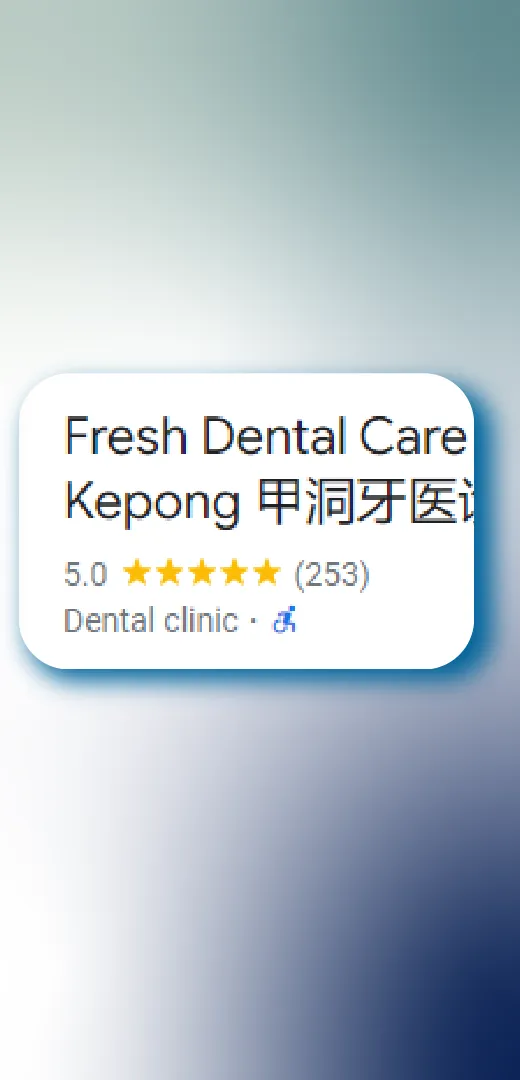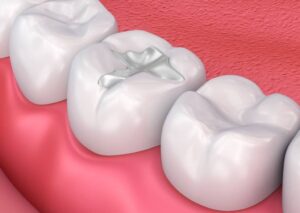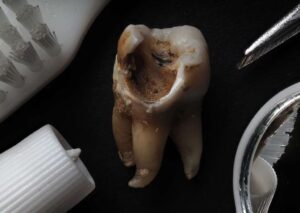

253 Happy Customers On Google
Initial Discomfort with Braces
Getting braces can be an important step toward achieving a beautiful, healthy smile. However, it’s no secret that braces can cause some initial discomfort. Many people in Kepong (and beyond!) have questions about this part of the process, so let’s dive into it.
Understanding Common Pain Associated with New Braces
Once the braces are applied, it’s normal to experience some soreness or discomfort. This usually happens because your teeth are starting to move, adjusting to the new pressure from the braces. It’s a bit like starting a new gym routine – your muscles might feel sore initially, but it means you’re making progress!
Pain is generally felt in:
- The teeth
- The gums
- The cheeks and lips, as they get used to the brackets and wires.
Typical Duration of Initial Discomfort
The good news is that this discomfort doesn’t last forever. Most patients report that the initial soreness peaks around 24-48 hours after getting their braces and then gradually decreases. By the end of the first week, you should be feeling much more comfortable.
Here’s what you can expect:
- Day 1-3: Peak soreness
- Day 4-7: Gradual reduction in discomfort
- Day 7 onwards: Most acute pain is gone, though there might be occasional mild discomfort as adjustments are made during orthodontic visits.
Pain Management Techniques
You don’t have to suffer through this discomfort. There are several effective strategies you can use to manage the pain:
- Over-the-Counter Pain Relievers: Medications like ibuprofen or acetaminophen can be very effective. Always follow the dosage instructions on the package.
- Orthodontic Wax: Available at Fresh Dental Care, this wax can be placed over brackets and wires that are irritating your mouth.
- Cold Compress: Applying a cold pack to the outside of your cheek can help reduce inflammation and numb the area.
- Soft Foods: Stick to foods like yogurt, mashed potatoes, and soups during the first few days. Avoid hard, crunchy, or sticky foods that might exacerbate the pain.
- Saltwater Rinses: A warm saltwater rinse (1 teaspoon of salt in a cup of warm water) can soothe sore gums and mouth tissues.
Remember, this discomfort is temporary and part of the journey toward a healthier smile. If your pain persists beyond the first week or is severe, don’t hesitate to contact Fresh Dental Care. Our team is here to guide you through the entire process, ensuring you have the most comfortable experience possible.
Got questions? Reach out to us via WhatsApp or visit our dental clinic in Kepong! We’re always here to help.
Causes of Braces Pain
If you’ve ever wondered why braces can be a bit uncomfortable or even downright painful at times, you’re not alone. It’s a topic that frequently comes up at Fresh Dental Care in Kepong. Understanding the causes can help you better manage the discomfort and stay on track for that beautiful smile.
Pressure on Teeth from Wire Tightening
One of the primary reasons braces cause pain is due to the pressure exerted on your teeth. When you get your braces tightened, the wire applies force to move your teeth into the correct position. This pressure is essential for straightening your teeth but can also result in some soreness.
Think of it like a workout for your legs. After a session of squats and lunges, your muscles feel sore because they’ve been stretched and worked beyond their usual limits. Similarly, your teeth experience a temporary phase of discomfort as they adjust to the new pressure.
Irritation from Metal Brackets and Wires
Metal brackets and wires rubbing against the soft tissues in your mouth can cause irritation and sores. It’s a bit like wearing a new pair of shoes – they may feel fine initially, but after a while, you can get blisters.
Using orthodontic wax can make a significant difference here. Applying a small amount to the brackets can create a smooth surface that reduces friction and irritation.
Changes in Blood Flow around Teeth
This might sound surprising, but changes in blood flow to your teeth play a role in the discomfort you feel. When the braces apply pressure, it also affects the blood flow around your teeth. This can lead to inflammation and, as a result, pain.
Imagine sitting in one position for a long time – your leg might start to feel numb or tingly because blood flow is restricted. When teeth are undergoing the alignment process, they experience something similar.
Pain Management for Braces
Braces can sometimes cause discomfort, but don’t worry! At Fresh Dental Care in Kepong, we’re here to help you manage any pain or irritation you might experience during your orthodontic treatment. Here are some tried-and-true tips to ease your aches and keep you smiling brightly!
Home Remedies
Sometimes, simple home remedies can do wonders for relieving the discomfort associated with braces. Here are a few to try:
Warm Saltwater Rinses
A warm saltwater rinse can soothe your mouth and reduce inflammation. Simply dissolve a teaspoon of salt in a glass of warm water and swish it around your mouth for about 30 seconds. Repeat a few times a day for the best results.
Ice Packs and Cold Foods
Applying an ice pack to the outside of your mouth can help numb the area and reduce swelling. Alternatively, indulging in cold foods like ice cream, smoothies, or chilled fruits can provide a similar soothing effect.
Oral Anesthetics
Over-the-counter oral anesthetics, like gels or liquids containing benzocaine, can be applied directly to sore areas in your mouth to provide quick, targeted pain relief. Always follow the directions on the packaging for safe use.
Gum Massage
Gently massaging your gums with your fingers can stimulate blood flow and alleviate soreness. Clean your hands thoroughly before doing so, and use a circular motion to massage the area around your braces.
Over-the-Counter Pain Relievers
Sometimes, home remedies aren’t quite enough, and you might need a bit more help managing pain. Over-the-counter pain relievers can be effective:
Acetaminophen and Ibuprofen Usage
Acetaminophen (Tylenol) and ibuprofen (Advil, Motrin) are commonly used to alleviate pain associated with braces. These medications can help reduce both pain and inflammation, making them excellent options for more severe discomfort.
Proper Dosage and Precautions
It’s important to take these medications as directed. Follow the dosage instructions on the label or as advised by your dentist. Overusing pain relievers can lead to unwanted side effects, such as stomach irritation or liver damage. Always screen for potential allergies or contraindications with other medications you’re taking.
Orthodontic Wax for Irritation
Orthodontic wax is a must-have for anyone with braces, especially when those brackets and wires start to irritate your cheeks, lips, or gums.
Application of Wax on Brackets and Wires
To use, take a small piece of wax and roll it between your fingers to warm it up. Then, press it onto the brackets or wires that are causing discomfort. The wax acts as a barrier, preventing the metal from rubbing against your soft tissues.
Protection for Cheeks, Lips, and Gums
Consider the wax your new best friend. It creates a smooth surface over the metal, offering protection and significantly reducing irritation in areas where your braces come into contact with your mouth’s delicate lining.
When Braces Hurt the Most
Getting braces can be a big step towards achieving a perfect smile, but many folks are concerned about the pain they might experience. Let’s break down when braces hurt the most and what you can do to ease the discomfort.
During Initial Fitting
The first time your braces are fitted, it’s common to experience some discomfort. Why? Well, your teeth are not used to the brackets and wires. It’s a bit like getting accustomed to a new pair of shoes—initially tight and uncomfortable, but eventually more bearable.
This discomfort can manifest as a sore or aching feeling in your teeth and gums. Don’t worry, this is completely normal! Using an over-the-counter pain relief medication, like ibuprofen, can help manage this initial pain. Also, eating soft foods, such as yogurt, mashed potatoes, and smoothies, for the first few days can keep you comfortable.
After Adjustment Appointments
Adjustment appointments are another time when braces tend to hurt the most. These are regular check-ups where the orthodontist makes adjustments to the braces to continue guiding teeth into their desired positions. Essentially, it’s like giving your teeth a workout, and just as with any good workout, you might feel sore afterward.
Expect this pain to be a bit more intense a day or two following the adjustment. The good news? It usually diminishes within a week. Staying on top of your pain relief and opting for softer foods will once again be your best allies.
Differences Between Upper and Lower Braces Pain
Interestingly, you might notice some differences between the pain in your upper and lower braces. Many patients often report that the lower braces cause more discomfort than the upper ones. This is largely because the teeth on the lower jaw are a bit stronger and denser, resulting in more pressure and, consequently, more pain when they are being moved.
Despite these differences, the coping strategies are the same: use over-the-counter pain relief, stick to softer foods, and apply orthodontic wax to any brackets causing irritation to your cheeks or gums.
When to Seek Professional Help
Persistent or Worsening Pain
Experiencing pain is no fun, especially when it comes to your teeth. We’ve all been there – a little discomfort from a new filling or sensitivity from a cold drink. But, if you notice that your pain is getting worse or just won’t go away, it’s time to consult a professional. At Fresh Dental Care, we understand how disruptive dental pain can be, and our dedicated team is ready to help you find relief quickly and effectively.
Persistent pain could indicate a deeper issue like an infection, an abscess, or a complication from a dental procedure. Don’t ignore it. We use advanced technology to diagnose the root cause swiftly, so you can get back to your day-to-day life pain-free. As a trusted dental clinic in Kepong, we’re just a WhatsApp message away.
Loose Brackets, Bands, or Wires
Orthodontic appliances can sometimes become loose or shift out of place. This is a common issue for anyone wearing braces, and it’s important to address it promptly. Loose brackets or bands can disrupt the alignment process, cause discomfort, and even affect your oral health.
Why put up with the inconvenience? At Fresh Dental Care in Kepong, we specialize in orthodontic care and can easily fix or replace loose components. Remember, a timely visit can prevent future complications and keep your treatment plan on track. Feel free to reach out to us anytime via WhatsApp for a quick consultation.
Regular Adjustment Appointments
Consistency is key when it comes to maintaining your braces or any other dental appliance. Regular adjustment appointments ensure everything is moving as it should, and make the necessary tweaks to keep your progress on schedule. Skipping these appointments can prolong your treatment time and may lead to unexpected issues down the road.
Braces Pain Scale
Typical Pain Levels Experienced
Braces bring about a change that can be a bit uncomfortable initially. It’s like embarking on a new fitness regimen – your muscles are sore at first, but they adapt over time. Similarly, when you get braces, you’ll typically experience mild to moderate pain. This is a completely normal part of the process. Most people report discomfort when the braces are first put on and then again after each adjustment.
But fear not, the pain is usually manageable! It’s similar to the sensation you feel after a good workout – it’s a sign that the treatment is working. Over-the-counter pain relievers like paracetamol or ibuprofen can help alleviate this discomfort, and our friendly team at Fresh Dental Care is always here to provide advice on effective pain management strategies.
Variation in Individual Experiences
Just like some people can run a marathon while others might prefer a brisk walk, pain tolerance and experiences with braces can vary widely among individuals. Some might only experience slight discomfort, while others could find it a bit more intense. Factors such as age, existing oral health conditions, and individual pain thresholds play a significant role.
For example, teens might experience less discomfort compared to adults as their teeth and jaws are still quite adaptable. If you’re concerned about the pain, remember, at Fresh Dental Care, we’re committed to making your braces journey as comfortable as possible. Always feel free to reach out via WhatsApp or visit our clinic in Kepong for personalized advice and support.

Top Rated Dental Clinic in Kepong, KL
FAQ
Q: How long do braces typically stay on?
A: Braces usually stay on for about 1 to 3 years, depending on the complexity of the case and how well the patient adheres to their treatment plan.
Q: What causes pain with braces?
A: Pain with braces is typically caused by the metal parts rubbing against the cheeks and gums, changes in blood flow to the teeth, and the gentle pressure required to move teeth into their proper positions.
Q: How can I manage brace pain?
A: There are various ways to manage braces pain effectively:
Dental Wax: Apply on sharp brackets to prevent rubbing.
Numbing Gel: Available at most pharmacies, it provides temporary relief.
Gum Massage: Gently massaging your gums can relieve tension.
Mouth Guard: Particularly useful at night to prevent grinding.
Cold Foods: Ice cream and cold soft foods can soothe sore gums.
Q: When should I seek professional help for brace pain?
A: Seek professional help if the pain persists or worsens despite using pain relievers, or if you notice any unusual symptoms like swelling or severe discomfort.
Q: Do bottom braces hurt more?
A: Yes, bottom braces can be particularly uncomfortable due to the tongue’s constant movement and the natural alignment of the jaw. Don’t worry, we have several strategies to make this more bearable!
Q: How much do braces cost in Malaysia?
A: The cost of braces in Malaysia typically ranges from RM3,000 to RM15,000, depending on the type of braces and the complexity of the treatment. At Fresh Dental Care in Kepong, we aim to provide affordable options without compromising on quality.
Q: Is getting braces painful?
A: Getting braces can cause some discomfort, especially during the first few days as your mouth adjusts to the new hardware. However, the pain is usually manageable with over-the-counter pain relievers and some simple home remedies.
Q: How long does braces pain last?
A: Initial braces pain usually lasts 3-5 days. Discomfort after adjustments typically subsides within 24-72 hours. Over the course of treatment, the pain generally decreases.
Q: What is the typical braces pain level?
A: The pain level is generally mild to moderate. Most patients report manageable discomfort that varies depending on the individual and the stage of treatment.
Remember, braces are a journey towards a healthier, more beautiful smile. If you ever need support or advice, don’t hesitate to contact Fresh Dental Care, your trusted dental clinic in Kepong. Our team is here to ensure your dental health is in the best hands. Book an appointment via WhatsApp today and take the first step towards a confident smile!





